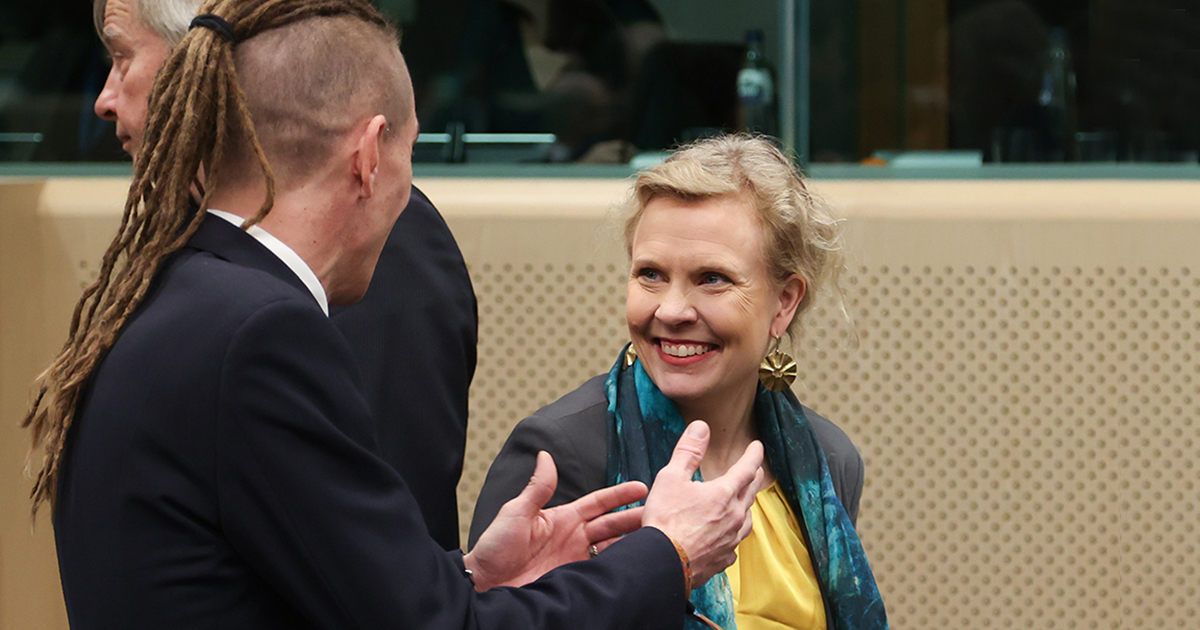The EU’s Telecommunications Council adopts the general approaches on artificial intelligence and eIDAS regulations

The EU's telecommunications ministers convened in Brussels on 6 December 2022. Finland was represented by State Secretary Pilvi Torsti. The meeting dealt with various proposals for regulations promoting digitalisation and its use.
"The proposal for a regulation on artificial intelligence is groundbreaking, the first of its kind worldwide. Likewise, the European digital identity wallet is key to trust-based digital development in Europe. In addition to supporting these significant decisions at the meeting, Finland emphasised the Data Act's major importance to the European internal market," says Pilvi Torsti, describing the outcomes of the meeting.
The Telecommunications Council adopted the general approach on the proposal for a regulation on artificial intelligence (AI). The European Commission aims to set up a regulatory framework to ensure that the AI systems used in the EU are safe and respect fundamental rights.
Finland has considered it important that the definition of AI systems only covers those that truly qualify as AI, and it has actively worked to narrow the definition of AI. The goal of a narrower definition of artificial intelligence is to ensure that certain automated decision-making systems can continue to be used normally.
The Telecommunications Council also adopted the general approach on the amendment of the eIDAS Regulation to strengthen the framework for European digital identity. The eIDAS Regulation provides for means of identification with a high level of security and privacy notified by Member States for cross-border electronic identification and trust services for electronic transactions.
In practice, European digital identity could be implemented as a digital wallet application running on a mobile device, with functions resembling traditional wallets. It could contain authenticated electronic personal data and certificates, such as a driving licence, related to the user.
The general approach is largely in line with Finland's goals, and Finland has actively influenced the proposal's formulation throughout the process. Finland considers the proposal to amend the eIDAS Regulation important. Efforts aimed at corresponding goals have already been initiated at the national level in the project on digital identity. Related legislation is currently being discussed in Parliament.
The Council received a progress report concerning the Data Act. Finland strongly supports the goals of the Data Act concerning data sharing and the promotion of the data economy. The Act would promote the principles of a fair data economy and balance the markets.
The Council also heard a progress report on the Cyber Resilience Act. Finland has supported the proposal's goal of ensuring increased cybersecurity of products placed on the market. The proposal can help improve the information security of all parties in society.
Moreover, the Council held a policy debate on digital skills for a digital decade. Finland has pioneered digitalisation at the EU level. A report on Finland's digital compass was submitted to Parliament in October 2022. It specifies the national goals for the use of digitalisation to ensure Finland's success in the ongoing transition. Finland has defined digital education as a goal and emphasises the digital skills of citizens.
The preparations for the Council meeting were supported by the Government's EU decision-making and coordination processes, as well as the ministerial working group on developing the digital transformation, the data economy and public administration. The situational picture of EU regulation and Finland's influencing targets concerning digitalisation and the data economy was last discussed at the ministerial group's meeting on 25 November.
Inquiries:
Johanna Juselius, Special Adviser to the Minister, Ministry of Transport and Communications, tel. +358 295 342 141, [email protected]
Maria Rautavirta, Director of Unit, Ministry of Transport and Communications, tel. +358 40 718 5975, [email protected]
Kaisa Kopra, Senior Specialist, Ministry of Transport and Communications, tel. +358 50 441 8005, [email protected]
Maria Hauptmann, Chief Specialist, Ministry of Economic Affairs and Employment, tel. +385 295 047 334, [email protected] (AI regulation)
Kristine Alanko, Specialist, Ministry of Economic Affairs and Employment, tel. +358 295 047 344, [email protected] (AI regulation)
Laura Kolinen, Senior Specialist, Ministry of Finance, tel. +358 50 476 8399, [email protected] (eIDAS)
Sonja Töyrylä, Senior Officer, Ministry of Transport and Communications, tel. +358 50 438 4729, [email protected] (eIDAS)
Press release 2 December 2022: The EU’s transport ministers will discuss the proposed TEN-T Regulation; artificial intelligence and digital identity on the agenda of telecommunications ministers (only available in Finnish and Swedish)
Council of the European Union: Transport, Telecommunications and Energy Council (Telecommunications), 6 December 2022
Press release, Ministry of Economic Affairs and Employment, 27 October 2022: Amendments to the EU’s proposed AI regulation – Parliament to be informed by a follow-up Union communication
Ministry of Finance: European wallet application



